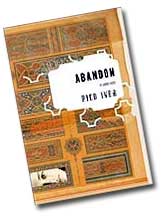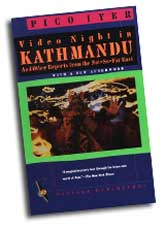Pico Iyer was born to travel. Born in England to Indian parents, he moved at the age of seven to California where he did his schooling. Educated at Eton, Oxford and Harvard, he later joined Time in New York, to sit in little cubicles and "write palpitating, breathless accounts of foraging my way through the Philippines jungles or ascending the Andes to find the Sendero Luminoso without ever having been to those places and without knowing what they look like".
Ajit Baral recently caught up with Pico Iyer in his travels through cyberspace. In this virtual interview, Iyer talks among other things about the book, Video Night in Kathmandu, that made him (and Kathmandu) famous.
 Ajit Baral: What purpose do travel writings such as The Great Railway Bazaar or Video Night in Kathmandu primarily serve? Aren't they just better written Lonely Planet Guides?
Ajit Baral: What purpose do travel writings such as The Great Railway Bazaar or Video Night in Kathmandu primarily serve? Aren't they just better written Lonely Planet Guides?
Pico Iyer: That's a wonderful question. I think that travel books of the kind you mention are the opposite of guidebooks, in that they don't tell you what to see, but how to see. In a way they offer a pair of spectacles as subjective and distorted as any other, but allow you to think about the world in a special way. In Video Night, I felt that there was nothing I could add to the wonderful accounts that writers more accomplished than I had offered. But there was something new going on-a fresh kind of exoticism-in the ways the East was taking in the West that seemed to speak to a whole new global culture. The only reason to write something, and inflict all those words on a reader and all those long hours at the desk on oneself, is if one can contribute something new that hasn't been covered already.
But what purpose does it serve in a world that has become smaller?
There are always uncharted places to discover and record: Iraq right now for example is in many ways a new country. The world is constantly in flux, there is never a shortage of new places to explore and come upon for the first time. Travel-writing, like fiction or poetry, has to take on new forms to deal with a new kind of world. In my next book, out next spring, I have a whole chapter on jet lag as a foreign land that no human had visited till forty or so years ago, but one where more and more of us spend more and more of our lives.  How do book journeys compare to geographic journeys?
How do book journeys compare to geographic journeys?
I'm most interested in the kinds of journeys that can be made while sitting still. Travel is only interesting to me in its inner effects, and the kind of transformations that can potentially come in the comfort of one's own home-and it's no coincidence that many of the great physical travellers are also great readers. Books are a form of travel as much as travels are a form of text. They offer a much more democratic form of travel that many more people can enjoy-more and more of the world is an honorary resident of New York or Los Angeles, in that sense (often with tragic results, especially if they try to come to those countries in life). 
But the place you wrote about yesterday will not be the same today. There isn't much left of the Freak Street in Video Night.
I'm less interested in roots than in flowerings. I don't have a very strong historical sense, and so, I'm much more compelled by the present and the future appearing around the corner than, say, musty churches or what happened in the place 300 years ago. So in writing about Freak Street, say, I was writing of a new blending of East and West. When I stayed in Los Angeles Airport for two weeks, I was trying, as best as I could, to see a new global future forming, in a place that might look like our cities of tomorrow (with people from a hundred cultures walking and talking past one another). The airplane has been more a theme for me than the bullock-cart. You're right that, as with Zeno's arrow and its paradoxical non-arrival, one can never catch the present because, by the time one's written about it, or photographed it, it is gone. Yet one can orient oneself towards trying to see what the future holds or chronicling and gauging the effects of the past (as such great traveling historians as Jan Morris or William Dalrymple have done). By looking at Freak Street, which no longer exists, I was trying to look at a new form of transnational tribalism that is in fact more with us with every passing year.
How about re-visiting places to take stock of the changes? Are you curious about what has happened to Kathmandu in the decade-and-half since Video Night?
I do tend to revisit the place I wrote about quite a lot, and of course, as the Buddhists tell us, nothing stays the same. The person observing the place is himself moving on or getting old, and inevitably he registers all the things he hadn't seen before, or now misses. But the underlying characters of places change no more than people do. In the case of Nepal, I did return seven years after my initial trip and found (as described in my book Tropical Classical) that there were many more tourists and motorcycles and the pollution was worse. But the sweetness of the Nepali people, and the various hopes or longings Westerners projected onto them (and vice-versa) had not changed much at all.
You seem to defy a definition of home. What is home to you?
Home to me is in part the English language, which has kept me company for every waking moment of my life. It exists in the friendships and beliefs and assumptions I carry everywhere I go. It is, as much as anything, a Japanese friend I return to and a Benedictine monastery where I stay four times a year every year.
VS Naipaul glories in his anxiety of belonging nowhere. Your writing, on the other hand, glories in belonging everywhere. Don't you need a mooring?
I feel that movement has been my inheritance, and I've rejoiced in it the way others might rejoice in being Bangladeshi or Indian or French. My particular home has been the state of movement, and that's where I belong, and what I'm used to-the space between places, or categories. I could wish that I had a different life, but to do so is as futile as wishing one were immortal, or every day never ended.
You have now started writing fiction. Which is more difficult fiction or travelogue?
Fiction is more difficult, and therefore more attractive and interesting to me. It is about surrender, and not being able to bribe the Muse to make house-calls, or force inspiration to come, which makes it at once more frustrating and more magical. It's the difference between walking around the block and completing a somersault in mid-air while holding a torch of flame in both hands. In all my travel-writing, most of what I'm writing about is the states inside us. So nobody that I'm aware of has talked of Abandon as a travel-book in disguise, or travelling incognito. They might note that it has vivid scenes of Damascus and Venice and Agra and Paris and Iran-not to mention California-but I think they see instantly that it's first and foremost a romance, a mystery and a novel of ideas. The scenery is just make-up.
Pico Iyer's books: Cuba and the Night, Abandon (both fiction), The Lady and the Monk, Falling off the Map, Tropical Classical, and Video Night in Kathmandu are all available in Kathmandu book shops.


